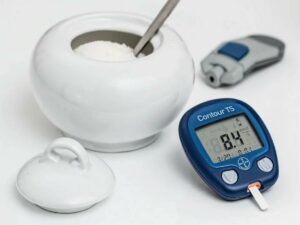Can fish oil help you lose weight? This is a question that many people are asking these days. There is a lot of evidence to suggest that omega-3 fatty acids can help with weight loss, but there is still some debate about this. In this blog post, we will explore the link between omega 3 fish oil and weight loss, and we will also discuss the right amount to take for weight loss.
Contents
Omega 3 Fish Oil And Weight Loss
Here are 5 ways by which omega-3 fish oil helps in weight loss:
Boost Metabolism
 Studies suggest that omega-3 fatty acids can help to boost the metabolism, which can in turn aid in weight loss. Omega 3s have been shown to stimulate enzymes that promote fat-burning and energy production.
Studies suggest that omega-3 fatty acids can help to boost the metabolism, which can in turn aid in weight loss. Omega 3s have been shown to stimulate enzymes that promote fat-burning and energy production.
Studies have shown that people who consume higher amounts of omega-3 fatty acids tend to have higher metabolic rates than those who do not. One study showed that those who consumed more omega-3 fatty acids had a 15% higher resting metabolic rate than those who didn’t.
Similarly, another study found that participants who consumed more omega-3 fatty acids had a lower body mass index (BMI) than those who didn’t. Moreover, the participants who ate more omega-3 fatty acids also had less body fat than those who didn’t. In addition to this, omega-3 fatty acids can also reduce inflammation in the body, which is linked to obesity and weight gain.
Reduce Appetite and Control Cravings
 Omega 3s help to regulate blood sugar levels, which can reduce appetite and cravings. This is because lower blood sugar levels make us feel fuller for longer periods of time. Omega 3s can also reduce leptin resistance, which is linked to increased appetite and cravings.
Omega 3s help to regulate blood sugar levels, which can reduce appetite and cravings. This is because lower blood sugar levels make us feel fuller for longer periods of time. Omega 3s can also reduce leptin resistance, which is linked to increased appetite and cravings.
Leptin is a hormone that controls our hunger and satiety. Studies have also shown that omega 3s can reduce ghrelin levels, which is the hormone responsible for signaling hunger to the brain. One study showed that people who consumed more omega-3 fatty acids had significantly lower levels of ghrelin.
Another study found that participants who consumed more omega-3 fatty acids had a reduced desire to eat and fewer cravings for unhealthy foods. Furthermore, omega 3s may help to reduce stress and anxiety, which can lead to emotional eating.
Increase Fat Burning
 Research suggests that omega-3 fatty acids can help to increase fat burning in the body. One study found that participants who consumed more omega-3s had higher levels of a fat-burning enzyme called carnitine palmitoyltransferase (CPT).
Research suggests that omega-3 fatty acids can help to increase fat burning in the body. One study found that participants who consumed more omega-3s had higher levels of a fat-burning enzyme called carnitine palmitoyltransferase (CPT).
This enzyme helps to break down fatty acids and can help to increase fat burning. Additionally, omega-3 fatty acids may also help to reduce visceral fat, which is body fat that accumulates around the organs and is linked to an increased risk of health problems.
A study published in the journal Lipids in Health and Disease showed that participants who consumed more omega-3 fatty acids had significantly lower amounts of visceral fat than those who consumed less.
Similarly, another study found that participants who consumed more omega-3 fatty acids had a lower body fat percentage than those who consumed less. What’s more, omega-3 fatty acids have also been shown to reduce adipose tissue, which is fat that accumulates around the midsection.
Improve Insulin Sensitivity
 Omega 3s have been shown to improve insulin sensitivity, which can help with weight loss. Insulin is a hormone that helps to regulate blood sugar levels, and people with insulin resistance have difficulty regulating their blood sugar levels.
Omega 3s have been shown to improve insulin sensitivity, which can help with weight loss. Insulin is a hormone that helps to regulate blood sugar levels, and people with insulin resistance have difficulty regulating their blood sugar levels.
Studies have shown that omega-3 fatty acids can improve insulin sensitivity and reduce inflammation, which can help with weight loss. Another study found that participants who consumed more omega-3 fatty acids had significantly lower levels of fasting insulin and glucose compared to those who didn’t.
Additionally, omega-3s have also been shown to reduce inflammation, which can lead to weight gain. A study published in the journal Obesity Reviews showed that participants who consumed more omega-3 fatty acids had significantly lower levels of inflammatory markers than those who consumed less.
Reduce Stress Levels
 Stress can lead to weight gain by increasing your cortisol levels. Cortisol is a hormone that controls how your body stores and uses energy. When cortisol levels are high, your body will store more fat which may make it harder to lose weight.
Stress can lead to weight gain by increasing your cortisol levels. Cortisol is a hormone that controls how your body stores and uses energy. When cortisol levels are high, your body will store more fat which may make it harder to lose weight.
Omega 3s can help to reduce stress and cortisol levels, which can help with weight loss. Research has shown that omega-3 fatty acids can reduce levels of the stress hormone, cortisol, which can help to reduce stress levels and aid in weight loss. Additionally, omega-3s have also been linked to improved mood, reduced anxiety, and improved mental clarity, which can also help to reduce stress levels.
By consuming omega-3 fatty acids on a regular basis, you can experience a variety of health benefits, including weight loss.
How Much Omega-3 Should I Take For Weight Loss?
The amount of omega-3 fatty acids you should take for weight loss will depend on your individual needs. Generally, it is recommended to consume 1-2 grams of omega-3s per day. If you are taking a supplement, make sure to get it from a reputable source. Follow the dosage instructions on the label. Additionally, try to incorporate more omega-3-rich foods into your diets, such as fatty fish, nuts, and seeds.
When Should I Take Fish Oil For Weight Loss?
The answer to this question depends on what your specific weight loss goals are. If you want to lose weight quickly, then taking fish oil could be beneficial as it can help to increase metabolism and reduce appetite. However, if you want to focus on long-term health benefits, then taking fish oil after meals is the best option. Taking fish oil between meals can help you feel fuller for longer, resulting in less calorie intake and potentially aiding in weight loss.
In addition to taking fish oil at meal times, it is also important to consider your diet. Diet has a major role to play when trying to lose weight. Eating a balanced diet that includes fruits, vegetables, whole grains, lean proteins, and healthy fats such as those found in fish oil can help you to reach your weight loss goals. Try to avoid processed foods, refined carbohydrates, and sugar-sweetened beverages as these can spike blood sugar levels and contribute to weight gain.
Overall, when it comes to taking fish oil for weight loss, there is no one-size-fits-all answer. Everyone is different and there are a variety of factors to consider when determining the best course of action. It is best to speak with your doctor or nutritionist. They will tell you what plan will work best for you. By following their advice and making smart dietary choices, you should be able to reach your weight loss goals.
Conclusion
Omega-3 fatty acids can have a variety of health benefits, including weight loss. They can help to reduce fat accumulation, improve insulin sensitivity and reduce stress levels. Additionally, they may also play an important role in reducing inflammation and improving mood. To reap the benefits of omega-3s for weight loss, try to incorporate more omega-3-rich foods into your diet. Omega-3 is present in fatty fish, nuts, and seeds, or take a supplement.
Consider contacting FitMantra for additional information on nutrition and fitness. You can also get in touch with their nutrition experts through our online nutrition counseling, who can guide you through the process and help you achieve your fitness goals. You can also lose weight with the help of our weight loss program. Download our Fitness app on Android to learn more about us.
